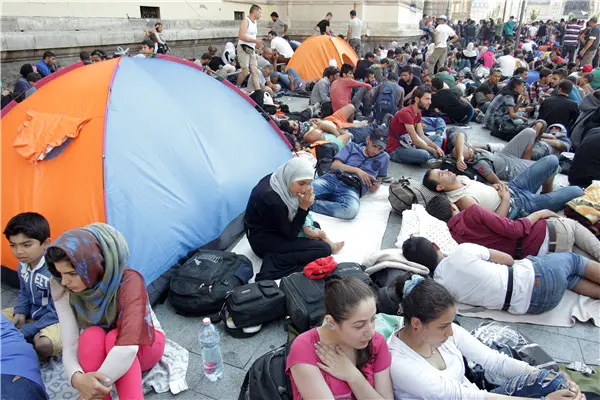The killing of nine African-Americans in a "hate crime" shooting Wednesday night mirrors the U.S. government's inaction on rampant gun violence as well as the growing racial hatred in the country.
The massacre, allegedly perpetrated by a white gunman, took place inside the historic Emanuel African Methodist Episcopal Church, near the heart of the southeastern U.S. city of Charleston's tourist district.
Built in 1891, the church is one of the most prominent black churches in the country and has one of the largest black congregations in the region.
"The only reason someone could walk into a church and shoot people praying is out of hate," Charleston Mayor Joe Riley told reporters.
Analysts said that unless U.S. President Barack Obama's government really reflects on his country's deep-rooted issues like racial discrimination and social inequality and takes concrete actions on gun control, such tragedy will hardly be prevented from happening again.
OBAMA ANGERS
On Thursday, Obama expressed anger over the church massacre and said the country has to face the fact that rampant gun violence only happens in the United States, which boasts a gun culture.
"I don't need to be constraint about the emotions that tragedies like this raise," he said in his first speech after the shooting spree. "To say our thoughts and prayers are with them and their families ... doesn't say enough to convey the heartache and the sadness and the anger that we feel."
Calling the hate crime shooting "senseless", he said the country has to shift how it thinks about the issue of gun violence collectively.
With a complexion of both sobriety and frustration, Obama said that six and half years into his presidency, he had had to make statements like the one he made on Charleston black church shooting too many times.
"Once again, innocent people were killed in part because someone who wanted to inflict harm had no trouble getting a gun," he said. "This type of mass violence does not happen in other advanced countries. It doesn't happen in other places with this kind of frequency."
Earlier on Thursday, Dylann Roof, a 21-year-old white man identified by the police as the suspect, was caught about 14 hours after the shooting in Shelby, North Carolina during a traffic stop, said Charleston police chief Gregory Mullen.
"We have a lot more investigation to do to find out why this happened," Mullen said. "We don't know if anybody was targeted other than the church itself."
Meanwhile, U.S. Attorney-General Loretta Lynch announced that the U.S. Justice Department had already opened a hate crime investigation into this shooting at the historic black church.
According to the police, Roof stayed at a prayer meeting for almost one hour before opening fire. A law enforcement official was quoted by the U.S. TV network CNN as saying that witnesses told them that the suspect said he was at the church "to shoot black people."
SIMMERING RACIAL TENSIONS
Wednesday's mass killing has again fueled simmering racial tensions in the United States.
In New York, a small group of about 60 demonstrators gathered Thursday in honor of the nine victims, calling for an end to killings of African Americans in the country.
The protestors, black and white, held aloft placards that read "Black lives matter" and "Stop killing black people" in Union Square in Manhattan.
Richard Cohen, president of the Southern Poverty Law Center (SPLC), a U.S. advocacy group founded in 1971, said in a statement that based on Roof's Facebook page, the suspect appeared to be a "disaffected white supremacist."
He said that since 2000, the SPLC has seen an increase in the number of hate groups in the country, adding Wednesday's church attack is a reminder that the threat of homegrown extremism is "very real."
"The increase has been driven by a backlash to the country's increasing racial diversity, an increase symbolized for many by the presence of an African American in the White House," said Cohen, whose group uses litigation, education and other forms of advocacy to fight hate and bigotry in the United States.
"It's an obvious hate crime by someone who feels threatened by our country's changing demographics, and the increasing prominence of African Americans in public life," he said. Enditem
 简体中文
简体中文

